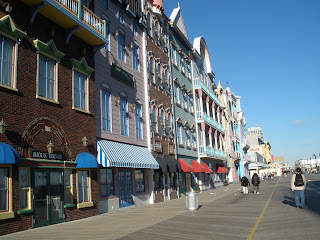Uganda would not go quietly into that dark night.
No, it went kicking and screaming, like a fussy child who isn’t quite ready for bed.
Our departure from Uganda was a real comedy of errors, plagued by calamity after calamity, starting with a flat tire and ending with a mad dash for the Uganda-Rwanda border…
After the turbulent drive to Kampala, we found that the car was worse for wear: Saturday morning, we awoke to find the car had one very sad looking flat tire. Fortunately, providence intervened in the form of essential equipment (spare tire, jack, etc.) and mechanical-savvy individuals (Lillian). So on Sunday night, the eve of our departure, Lillian and Garron rolled up their sleeves and triumphantly changed out the flat tire.
Day of Departure, 9:00 AM
With the car loaded, we put on our game faces, ready to tackle the 10 or so hours of that awful drive. Knowing that it would take ~8.5h out of 10 to reach the Uganda-Rwanda border, and knowing that the border would close at 7:00 PM, we figured that we had a good 1.5h cushion to ensure we reached the crossing in time.
All ready to go, and… click.
The car wouldn’t start.
We regretfully realized that, after two days of idling in the parking lot, the car battery had died. (Most cars have such poor batteries they require you to drive them on a consistent basis to keep the juices flowing, so to speak.)
The staff at the guesthouse kindly called someone to assist us.
 (Getting the car jumped… Note the sour expression on my face)
(Getting the car jumped… Note the sour expression on my face)
9:20AM
A bit behind schedule, we still figured we would be in good shape for the drive and the border…
Unfortunately, the spare tire would not cooperate with us… It tugged at the steering wheel and felt totally misaligned… Worried that either it or the car would not fare well on the trip, we pulled into a garage to have the pressure checked.
 (Pot-holes-cum-ponds on a Kampala road)
(Pot-holes-cum-ponds on a Kampala road)
As it turned out, the pressure was somewhere “close to exploding” (the mechanic’s words), so our only recourse was to repair the original tire and change out the spare.
 (At the garage, fixing the original tire… Lillian being our advocate for all matters car.)
(At the garage, fixing the original tire… Lillian being our advocate for all matters car.)
9:45 AM
A little more behind schedule, we felt confident now that, with a rejuvenated tire, we could make up some time on the road and still reach the crossing in time…
Sadly, my navigational skills failed me a bit on our exit from the city, and put us squarely in the middle of a bus depot.
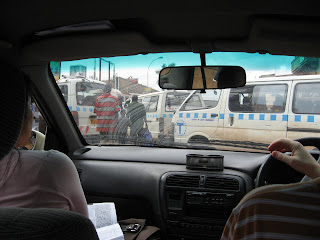 (Crush of buses)
(Crush of buses)
10:00 AM
Extracted from the traffic mess, we breathed a sigh of relief, picked up some speed and finally, felt on our way…
10:30 AM
Sarah: “Oh look! That must be Lake Victoria! How pretty!”
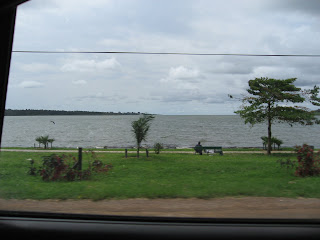 (Lake Victoria)
(Lake Victoria)
Lillian: “I don’t remember seeing it on the way here…”
Me: (sinking feeling) “OH CRAP.”
I frantically flipped open the map and realized that we had been traveling 30 minutes in the wrong direction.
Once again, my navigational skills failed me and if it were physically possible for me to give myself a solid kick in the pants, I would have.
11:30 AM
Having back-tracked back to Kampala and re-directed ourselves on the correct path, we picked up the pace, knowing that our border-crossing window had now become much narrower…
We stopped to get gas in a dusty little outpost called Lukaya.
After the debacle with the battery, we all chanted to ourselves that we must NOT turn off the engine, we must NOT turn off the engine.
So, we filled the tank with the engine running (tsk tsk, I know), stretched our legs for a bit, hopped back in and… click.
Garron hit the ignition again and succeeded in shutting off the engine. And as luck would have it, the car wouldn’t start again.
The garage brought help to jump the car and after multiple tries, we found that this time, the battery was not the culprit. A mechanic discovered that the starter needed to be repaired. So we begged him to please do it, whatever it takes.
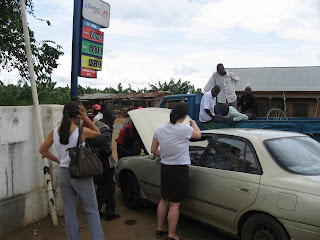 (Getting the car fixed in Lukaya… You can’t see it, but I have another sour expression on my face)
(Getting the car fixed in Lukaya… You can’t see it, but I have another sour expression on my face)
12:00 PM
One-hundred dollars poorer, we liberally thanked the mechanic, hastily jumped in the car and pressed on the gas.
Now we were in real danger of not making the border in time, and there was no time to waste.
Garron calculated that we needed to maintain an average speed of 100 km/h in order to make it there in time, which, given the state of the road and the many, many challenges (reckless trucks and buses, livestock… see previous post) along the way, was asking a lot…
Afternoon-ish
Lillian: “Do you guys hear that? It sounds like something rattling.”
We pulled over, left the car running, and inspected the car. There was nothing visibly amiss, but there was some strange leakage. “Oh well, no time to stop and worry – we have a border crossing to make!”
We hopped back in and sped off again.
_______________________________
Zero Degrees
Kampala, Latitude = +0.19 degrees
Kigali, Latitude = -1.195 degrees
With no time to play tourist, we saw the big white round sign whiz by and thought, Oh how cool. We’ve just crossed over the Equator.
_______________________________
Late afternoon-ish
A large rock (or something) flew up into the windshield and gave it a lovely snowflake-shaped crack. Then like a shooting star, it crept laterally across windshield.
Great.
6:55 PM
At the expense of fried nerves and cold sweats, we made up significant time and reached the Ugandan border with only 5 minutes left.
With the crossing in sight, we armed ourselves with passports and pens, ready to leap out of the car and attack the Ugandan immigration desk.
At this late hour, immigration was blissfully line-free and we filled out our departure forms and exchanged niceties with the immigration officers in record time. I even managed to make friends with the gentleman who assisted me with the car’s customs declaration.
6:58 PM
We piled back in the car, and… click.
Garron: “Oh my gosh.”
Sarah: “Garron, STOP JOKING.”
Garron: “I’m not kidding. The car won’t start.”
Like 4 chickens that had recently lost their heads, we leapt out of the car and started flailing about.
Me: “Put it in neutral and we’ll push the car over the border!!!”
Luckily, a Ugandan offered to look under our hood, and quickly spotted a cable that had become disconnected from a diode of the car battery. He reconnected it and voila! The car started.
We burst into rapturous applause and probably startled him with our disproportionate response to his simple solution. After slapping the last of our Ugandan shillings into his hand, we sped the 400m or so across the border and re-entered Rwanda.
7:00 PM
Me: “Where is my passport? Omigosh, I just had it. WHERE IS MY PASSPORT?!?”
The rest: “What?!?”
Like 4 chickens that had recently lost their heads, we leapt out of the car and started flailing about.
Frenetically, we started emptying all the compartments of the car, rooting around like children in the bottom of their toy chests. Garron even re-popped the hood.
Helpful Rwandan, inspecting under the hood: “What’s the problem?”
Garron: “She’s lost her passport.”
Helpful Rwandan, puzzled: “And you’re looking in the engine?”
Garron: “I don’t know, she lost it over there, and we looked under the hood…”
Meanwhile, I was breathlessly running circuits of the 400m dash between the car and the border crossing, furiously gesticalating over the gate to ask my new-found friend on the other side to check if he had seen a passport lying around.
I imagined what the locals must be thinking, as they watched the scene unfold:
A car of muzungus blazes up to the gate in a cloud of dust. They jump out of their car and run into the office. Five minutes later, they reemerge, jump back in their car, and after a few seconds, jump out again and start circling the car and shaking their heads. The Blond Girl looks like she will cry. A Very Wise Ugandan diagnoses the car problem and they jump back in the car and drive to the Rwandan side. On the other side, they jump out of their car again and start throwing away everything inside their car. One of the Chinese Girls starts some sport of running back and forth from the car and the gate. Her hair is a mess. Strange muzungus.
7:05PM
Miraculously, I found my passport, slyly tucked flush against the inside pocket of the passenger door, where I had put it in the first place. Je suis une IDIOTE.
Frazzled, we pounded against the window of the Rwandan immigration desk, pleading with them to process our paperwork: “Yes, we know it’s late, but we just came through Ugandan immigration, and if you could just please, please help us...”
Perhaps they saw our weary mugs, streaked with sweat and wild-eyed with desperation, and felt sorry for us, because even though we were 5 minutes late, they went ahead and stamped our passports.
So Rwanda welcomed us home. And the return never felt so sweet.
 What an address!
What an address!














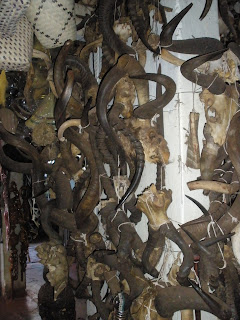









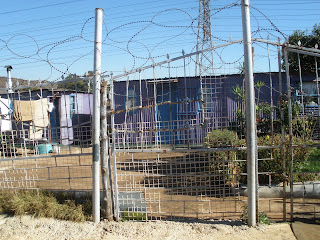






 (Pot-holes-cum-ponds on a Kampala road)
(Pot-holes-cum-ponds on a Kampala road) (At the garage, fixing the original tire… Lillian being our advocate for all matters car.)
(At the garage, fixing the original tire… Lillian being our advocate for all matters car.) (Crush of buses)
(Crush of buses) (Lake Victoria)
(Lake Victoria) (Getting the car fixed in Lukaya… You can’t see it, but I have another sour expression on my face)
(Getting the car fixed in Lukaya… You can’t see it, but I have another sour expression on my face)








